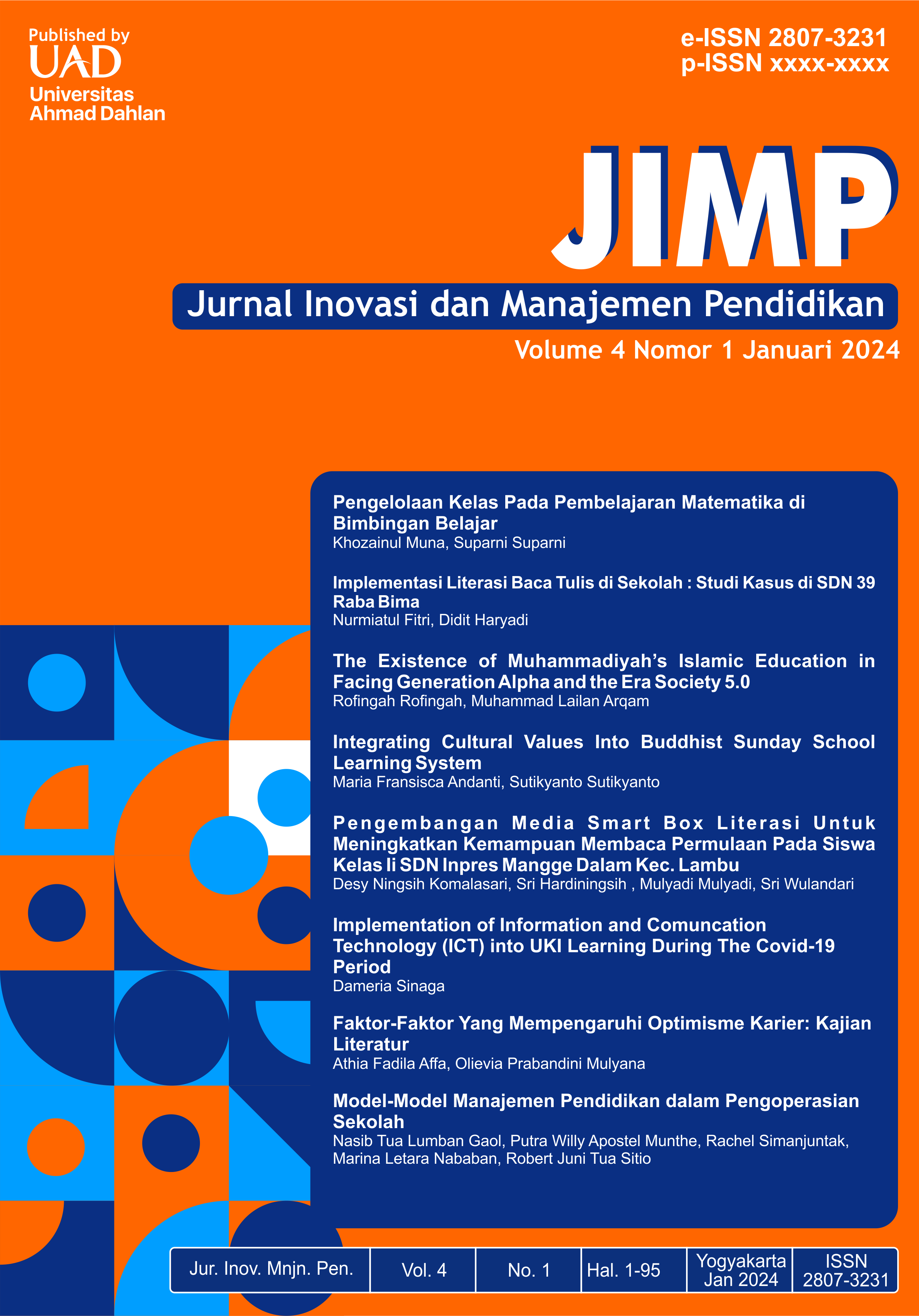Model-Model Manajemen Pendidikan dalam Pengoperasian Sekolah
DOI:
https://doi.org/10.12928/jimp.v4i1.10213Keywords:
Model Manajemen, Kepala Sekolah, Model Kepemimpinan, Manajemen PendidikanAbstract
Sekolah sebagai sebuah organisasi pendidikan dasar dan menengah tidak akan mampu beroperasi secara optimal apabila kepala sekolah tidak memahami dan mampu mengimplementasikan model-model manajemen pendidikan dengan tepat. Meskipun begitu penting hal tersebut, studi tentang model manajemen pendidikan masih terbatas dilakukan dalam konteks pengoperasian sekolah. Penelitian ini menggunakan metode kualitatif yang bertujuan untuk menginvestigasi dan menjelaskan model manajemen pendidikan dan kepemimpinan yang dibutuhkan kepala sekolah dalam mengoperasikan sekolah. Secara khusus, sebuah pendekatan tinjauan literatur naratif digunakan agar dapat menemukan berbagai referensi yang relevan dengan topik pembahasan. Hasil penelitian menunjukkan bahwa terdapat enam model manajemen pendidikan yang dapat diimplementasikan kepala sekolah, yakni: model manajemen formal, model manajemen kolegial, model manajemen politis, model manajemen subjektif, model manajemen ambigu, dan model manajemen kultural. Keenam model manajemen tersebut memiliki karakteristik, kelebihan, dan kelemahan masing-masing di mana perlu dipertimbangkan dengan bijaksana apabila kepala sekolah hendak mengimplementasikannya dengan berhasil. Selain itu, setiap model manajemen pendidikan tersebut berkaitan dengan model-model kepemimpinan tertentu. Hal tersebut dikarenakan aktivitas manajemen dan praktik kepemimpinan tidak dapat dipisahkan. Dengan demikian, kepala sekolah perlu menyesuaikan model manajemen dengan model kepemimpinan yang diterapkan ketika mengoperasikan sekolah.
References
Bandur, A. (2018). Stakeholders’ responses to school-based management in Indonesia. International Journal of Educational Management, 32(6), 1082–1098.
Bandur, A., Hamsal, M., & Furinto, A. (2022). 21st Century experiences in the development of school-based management policy and practices in Indonesia. In Educational Research for Policy and Practice (Vol. 21, Issue 1, pp. 85–107). https://doi.org/10.1007/s10671-021-09293-x
Berkovich, I., & Eyal, O. (2021). A model of emotional leadership in schools: Effective leadership to support teacher’s emotional wellness. Routledge.
Boddy, D. (2020). Management Using Practice and Theory to Develop Skill (8th Edition). Pearson Education Limited.
Bodrožić, Z., & Adler, P. S. (2018). The evolution of management models: A Neo-Schumpeterian theory. In Administrative Science Quarterly (Vol. 63, Issue 1). https://doi.org/10.1177/0001839217704811
Bolman, L. G., & Deal, T. E. (2021). Reframing organizations: Artistry, choice, and leadership (7th Edition). Jossey-Bass.
Bush, T. (2006). Theories of educational management. International Journal of Educational Leadership Preparation, 1(2), 1–25.
Bush, T. (2007). Educational leadership and management: Theory, policy, and practice. South African Journal of Education, 27(3), 391–406.
Bush, T. (2008). Leadership and management development in education. Sage Publications.
Bush, T. (2020). Theories of educational leadership and management (5th ed.). Sage.
Bush, T., Creighton, T., Dembowski, F., Echols, C., Glass, T., Hoyle, J., & Kelehear, Z. (2012). Educational administration: The roles of leadership and management. In Educational Administration: The Roles of Leadership and Management. The Open University of Hongkong.
Connolly, M., James, C., & Fertig, M. (2019). The difference between educational management and educational leadership and the importance of educational responsibility. Educational Management Administration and Leadership, 47(4), 504–519.
Craig, I. (2021). Whatever happened to educational management? The case for reinstatement. Management in Education, 35(1), 52–57.
Everard, K. B., Morris, G., & Wilson, I. (2004). Effective school management (4th Edition). London: Paul Chapman Publishing.
Fried, E. I. (2021). Theories and models: What they are, what they are for, and what they are about. Psychological Inquiry, 31(4), 336–344.
Ghasemy, M. (2014). Theories of educational management and leadership: A review. Conference: Seminar Kebangsaan Majlis Dekan-Dekan Pendidikan IPTA 2014At: University of Malaya, Malaysia. http://eprints.um.edu.my/id/eprint/13542
Gonzales, M. (2020). Systems Thinking for supporting students with special needs and disabilities: A handbook for classroom teachers. Springer Nature.
Gori, J. M. (2014). Application of collegiality in schools: A case of Gaborone private secondary schools, Botswana. Journal of Education and Practice, 5(5), 183–189.
Hannah, D. P., & Tidhar, R. (2018). The value of formal models for management theory. 78th Annual Meeting of the Academy of Management, AOM 2018, 1. https://doi.org/https://doi.org/10.5465/AMBPP.2018.195
Kadir, A. (2024). Penerapan Model-Model Manajemen dalam Pengembangan Pondok Pesantren. Jurnal Ilmu Pendidikan &Sosial (Sinova), 2(1), 51–60
Kareem, J., Patrick, H. A., Prabakaran, N., Valarmathi, B., Tantia, V., Pramod Kumar, M. P. M., & Mukherjee, U. (2023). Transformational educational leaders inspire school educators’ commitment. Frontiers in Education, 8(May), 1–10. https://doi.org/10.3389/feduc.2023.1171513
Karim, S. A. (2021). Mapping the problems of Indonesia’s education system: Lessons learned from Finland. Tell: Teaching of English Language and Literature Journal, 9(2), 86-100.
Kools, M., & Stoll, L. (2016). What makes a school a learning organisation? A guide for policy makers, school leaders and teachers. In Policy Advice and Implementation Support (Issue 137). http://dx.doi.org/10.1787/5jlwm62b3bvh-en
Kraus, S., Breier, M., Lim, W. M., Dabić, M., Kumar, S., Kanbach, D., Mukherjee, D., Corvello, V., Piñeiro-Chousa, J., Liguori, E., Palacios-Marqués, D., Schiavone, F., Ferraris, A., Fernandes, C., & Ferreira, J. J. (2022). Literature reviews as independent studies: guidelines for academic practice. Review of Managerial Science, 16(8), 2577–2595.
Lumban Gaol, N. T. (2020). Sejarah dan konsep manajemen pendidikan. Jurnal Dinamika Pendidikan, 13(1), 79–88.
Lumban Gaol, N. T. (2023a). School leadership in Indonesia: A systematic literature review. Educational Management Administration and Leadership, 51(4), 831–848.
Lumban Gaol, N. T. (2023b). Teori dan model manajemen pendidikan: Sebuah kajian fundamental. Jakarta: Scifintech Andrew Wijaya.
Lumban Gaol, N. T., Lumban Tobing, L., Pardede, V. W., Bukidz, D. P., Sianturi, M., & Purba, E. F. (2023c). Deductive thematic analysis of educational leadership styles in Indonesian religious school. Jurnal Kependidikan: Jurnal Hasil Penelitian dan Kajian Kepustakaan di Bidang Pendidikan, Pengajaran dan Pembelajaran, 9(3), 1007-1018.
Lumban Gaol, N. T., & Siahaan, K. R. (2021). Eksplorasi skill kepemimpinan kepala sekolah sebagai pemimpin di satuan pendidikan. Manajemen Pendidikan, 16(2), 97–112.
Lunenburg, F. C. (2017). Organizational structure and design. Journal of Educational Leadership and Policy Studies, 1(1), 21–43.
Madhakomala, R., Hakim, M. A., & Syifauzzuhrah, N. (2022). Problems of education in Indonesia and alternative solutions. International Journal of Business, Law, and Education, 3(3), 135–144.
Mckimm, J., & Swanwick, T. (2013). Educational leadership. In Understanding Medical Education: Evidence, Theory and Practice: Second Edition (pp. 473–491). John Wiley & Sons Ltd. https://doi.org/10.1002/9781118472361.ch33
McKimm, J., & Swanwick, T. (2019). Educational leadership and management. In T. Swanwick, K. Forrest, & aBridget C. O’Brien (Eds.), Understanding Medical Education: Evidence, Theory, and Practice (pp. 549–568). John Wiley & Sons Ltd.
Morrell, F. (1988). The management of education: A political perspective. Educational Management and Administration, 16, 104–114.
Morris, J. E., Lummis, G. W., Lock, G., Ferguson, C., Hill, S., & Nykiel, A. (2020). The role of leadership in establishing a positive staff culture in a secondary school. Educational Management Administration and Leadership, 48(5), 802–820.
Muraru, D., & Patrascu, E. (2017). Management models and school leadership. The Journal Contemporary Economy, 2(4), 125–130.
Muraru, D., & Pătrașcu, E. (2017). Management models and school leadership. The Journal Contemporary Economy Revista Economia Contemporană, 2(4), 125–130.
Newton, P., Burgess, D., & Burns, D. P. (2010). Models in educational administration: Revisiting Willower’s “Theoretically Oriented” critique. Educational Management Administration and Leadership, 38(5), 578–590.
Pautasso, M. (2020). The structure and conduct of a narrative literature review. In M. M. Shoja, A. Arynchyna, M. Loukas, A. V. D’Antoni, S. M. Buerger, M. Karl, & R. S. Tubbs (Eds.), A Guide to the Scientific Career (pp. 299–310). John Wiley & Sons, Inc. https://doi.org/10.1002/9781118907283.ch31
Pech, S., Siribanpitak, P., & Sumettikoon, P. (2015). Development of a dual-system school management model for the Kingdom of Cabodia. Scholar: Human Sciences, 7(1), 186–202.
Robbins, S. P., Coulter, M., & DeCenzo, D. A. (2017). Fundamentals of management: Management myths debunked! (10th Edition). Pearson Education.
Siddaway, A. P., Wood, A. M., & Hedges, L. V. (2019). How to Do a Systematic Review: A Best Practice Guide for Conducting and Reporting Narrative Reviews, Meta-Analyses, and Meta-Syntheses. Annual Review of Psychology, 70(July), 747–770. https://doi.org/10.1146/annurev-psych-010418-102803
Snyder, H. (2019). Literature review as a research methodology: An overview and guidelines. Journal of Business Research, 104(March), 333–339.
Sykes, A. H. (2015). Models of educational management: The case of a language teaching institute. Journal of Teaching and Education, 4(1), 17–23.
Tamadoni, A., Hosseingholizadeh, R., & Bellibaş, M. Ş. (2021). A systematic review of key contextual challenges facing school principals: Research-informed coping solutions. Educational Management Administration and Leadership. https://doi.org/10.1177/17411432211061439
Tosti, D. (2014). 10 management models: How to understand and apply the world’s most powerful business tools. Infinite Ideas Limited.
Totseva, Y. (2015). Communication management in school. The Eurasia Proceedings of Educational & Social Sciences (EPESS)-Selection and Peer-Review under Responsibility of the Organizing Committee of the Conference, 3, 118–128. http://www.epess.net/en/pub/issue/30751/332672
Yıldırım, A. (2021). School principals’ views regarding the use of social media in school management: A phenomenological research. International Journal of Quality in Education, 5(1), 33–55.
Downloads
Published
How to Cite
Issue
Section
License
Copyright (c) 2024 Nasib Tua Lumban Gaol, Rachel Simanjuntak, Putra Willy Apostel Munthe, Marina Letara Nababan, Robert Juni Tua Sitio

This work is licensed under a Creative Commons Attribution-ShareAlike 4.0 International License.
This article's copyright is transferred to Universitas Ahmad Dahlan (UAD) if and when the item is accepted for publication. The undersigned hereby transfers any rights in and to the paper including without limitation all copyrights to UAD. The undersigned hereby represents and warrants that the article is original and that he/she is the author of the paper, except for material identified as to its source, with permission notices from the copyright owners where required. The undersigned represents that he/she has the power and authority to make and execute this assignment.
We declare that:
This paper has not been published in the same form elsewhere.
It will not be submitted anywhere else for publication before acceptance/rejection by this Journal.
Copyright permission is obtained for materials published elsewhere and which require this permission for reproduction.
Furthermore, I/We hereby transfer the unlimited rights of publication of the above-mentioned paper in whole to UAD. The copyright transfer covers the exclusive right to reproduce and distribute the article, including reprints, translations, photographic reproductions, microform, electronic form (offline, online), or any other reproductions of similar nature.
The corresponding author signs for and accepts responsibility for releasing this material on behalf of any co-authors. This agreement is to be signed by at least one of the authors who have obtained the co-author(s) assent where applicable. After submission of this agreement signed by the corresponding author, changes of authorship or in the order of the authors listed will not be accepted.
Retained Rights/Terms and Conditions
Authors retain all proprietary rights in any process, procedure, or article of manufacture described in the Work.
Authors may reproduce or authorize others to reproduce the Work or derivative works for the author's personal use or company use, provided that the source and the UAD copyright notice are indicated, the copies are not used in any way that implies UAD endorsement of a product or service of any employer, and the documents themselves are not offered for sale.
Although authors are permitted to re-use all or portions of the Work in other works, this does not include granting third-party requests for reprinting, republishing, or different types of re-use.







